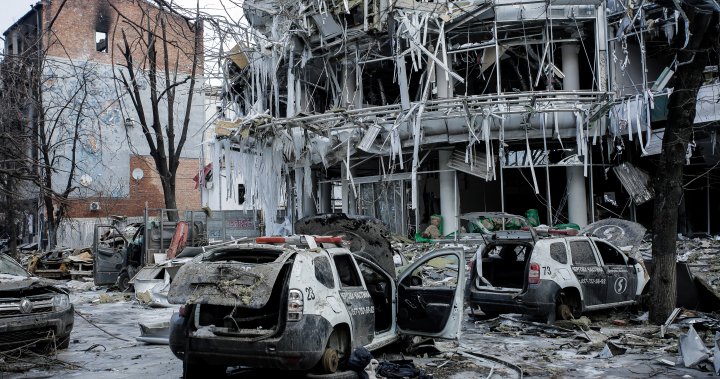The French left’s ‘ouf!’ of relief masks the truth: this was no victory for Macron | Pauline Bock
When Emmanuel Macron’s face appeared on TV at 8pm last night, my friends and I breathed a sigh of relief. With Marine Le Pen’s National Rally (formerly National Front), the far right had come perilously close to gaining power in France, and after two weeks of constant worry about what that would mean for our country’s minorities and institutions, disaster was averted.
The same scene was repeating all around France, as we received texts reading “Ouf!” (“Phew !”). It’s an “Ouf!” French voters know too well by now: we already shared it five years ago, when Macron and Le Pen faced each other in the runoff of the 2017 presidential election and he won by 66% of the vote to 34%. But this time, he only defeated her by 58.5% to 41.5%, and the feeling of deja vu quickly gave way to indignation. In April 2002, when Marine Le Pen’s father, Jean-Marie, stunned France by going to the runoff against Jacques Chirac, the National Front was defeated 18% to 82%. The margin for comfort has all but evaporated in two decades. How much can we relax when the far right comes closer to reaching the Elysée at every election?
It turns out you can relax quite a bit if you are one of Macron’s ministers. Shortly after the announcement, ministers Barbara Pompili and Joël Giraud were filmed dancing to One More Time by Daft Punk on Paris’s Champ de Mars, where Macron’s supporters rallied by the Eiffel Tower to celebrate their victory. The scene was viewed as tone-deaf by many, among them the Green party chief, Julien Bayou, who deemed it “indecent” to party as the “country is fractured”, and compared the DJ at Macron’s celebration to “the orchestra on the sinking Titanic”. Le Monde newspaper described “a soiree without triumph” due to the “historic result” of the far right and France 24 described Macron’s win as a “Pyrrhic victory”, meaning he won at the price of losses so great that it’s almost equal to a defeat.
Macron himself was more reserved than his ministers. In contrast to his 2017 win, when he appeared alone, he chose to be accompanied to the stage by his wife, Brigitte, and a dozen children and teenagers, as a way to embody the future and his new mantra, “Nous tous” (“All of us”). On stage, he hailed “the start of a new era”, promised that it will “not be a continuation of this ending five-year-term” and said that he would turn France into “a great green nation”. “To all those who voted for me, not in support of my ideas but to block the far right from winning, your vote obligates me,” he declared. “Tonight, I am no longer the candidate of one side, but the president of all.”
Indeed, of all who voted for Macron, 42% did so first and foremost to block the far right. With the record levels of abstention (28%) and the growing far-right vote, this signals a divided France that can only agree on one thing: Macron might have been the lesser of two evils, but he was not reelected for his ideas. On the French left, especially, many found it hard, if not insurmountable to vote for Macron again. For many leftwingers, voting for Macron, the financial banker turned centrist candidate who pledged to transform France into a “startup nation”, was distasteful enough in 2017. Voting for him again, after five years as a president who has favoured the rich, violently repressed protesters, remained apparently unmoved by climate emergency calls and sat and watched, if not helped, as the far right rose into the mainstream, was painful. Cynics joked that in order to stop the far right, they were kissing more of their social rights goodbye.
Macron has been reelected, but he is still seen as contemptuous and known to give grand speeches about governing for all, before doing the opposite. Just this morning, the economy minister, Bruno Le Maire, said that there would be “no guarantee” that the new government would refrain from using a constitutional tool known as “article 49.3” to forcefully pass its widely hated pensions system reform, which would delay the legal retirement age to 65 (it’s currently 62). With distrust of Macron running so rampant that many preferred to abstain and risk far-right rule, it’s perhaps no surprise that less than two hours after his re-election, demonstrators massed in Paris’s Place de la République to demand Macron’s resignation. “Macron, clear off!” they chanted. (Police brutally contained them.)
“For sure, the coming years won’t be quiet,” Macron admitted last night. The left is already plotting to block his reforms by forming a majority in parliament, as the French will be back to the polls for parliamentary elections on 12 and 19 June. In practice, if Macron’s party doesn’t control a majority in the next National Assembly, the president will have to pick a prime minister representing the parliamentary forces or risk a government that will be challenged by the House at every turn. “The third round starts tonight,” Jean-Luc Mélenchon, who does not hide his hopes to become such a prime minister, said last night.
In 2017, Macron was afforded the benefit of the doubt by voters who faced no choice but to back him to fight off Le Pen. This time around, he has six weeks to reverse five years of climate inaction and disdain towards the youth if he hopes to be true to his word. This time around, everyone knows the president has no clothes. Soon, he may also have no parliamentary majority.





